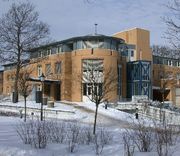Partners in Potsdam
GFZ Helmholtz Centre for Geosciences (GFZ)
The GFZ is Germany’s premier institute for the geosciences, with strong links to leading institutes across Europe. Research in 24 sections of the GFZ ranges across the full breadth of the Earth Sciences from the dynamics of Earth’s deep interior to remote observation of its active surface. The core competence of GFZ is the sciences of the solid Earth encompassing the fields of geodesy, geophysics, geology, mineralogy, geochemistry, geochronology, geomorphology, physics, mathematics, biology and engineering. The GFZ has a strong tradition in the monitoring of our planet with geophysical and remote sensing techniques, working globally, but with major, multi-disciplinary investments in regional observatories. The GFZ employs more than 1000 people, amongst them about 20 professors with academic appointments at nearby universities, 350 further scientists and more than 100 PhD students.
All work at the GFZ benefits from generous technical support and a uniquely comprehensive range of state-of-the-art equipment. Two sections at the GFZ participate in this consortium:
The Lithosphere Dynamics group of Onno Oncken is internationally recognised for its expertise in structural geology, seismology, geodesy and tectonics, particularly related to convergent plate boundaries (Andes, Alps, Ural, Variscides). This group coordinates the development of an integrated plate boundary observatory in Chile (IPOC) dedicated to observing the full spectrum of deformation processes in a subduction zone, their topographic response and interaction with climate-related processes. At GFZ Potsdam, the group host a state-of-the-art Laboratory for Experimental tectonics (HELTEC) which will serve as an analoge modelling facility of the SUBITOP consortium.
The Geomorphology group of Niels Hovius has world-leading expertise of erosion and its role in geophysical and bio-geochemical systems. This group works primarily in active mountain belts, often in subduction settings.
LaVision GmbH
LaVision of Göttingen, Germany offers imaging systems for flow field analysis and non-destructive material testing, high-performance cameras and optical sensor systems for scientific and industrial markets. Horst Nagel represents LaVision and is involved in ESR11.
Schulze Powder Technology
Schulze Powder Technology, Germany manufactures and supplies material testing devices including hard- and software as well as technical and physical expertise in powder technology. Dietmar Schulze represents Schulze Powder Technology is involved in ESR15 and ESR11.
Partner Schools
Vicco-von-Bülow-Gymnasium Stahnsdorf, Germany (Partner School for ESR11)
Leibnitz-Gymnasium Potsdam, Germany (Partner School for ESR 15)




